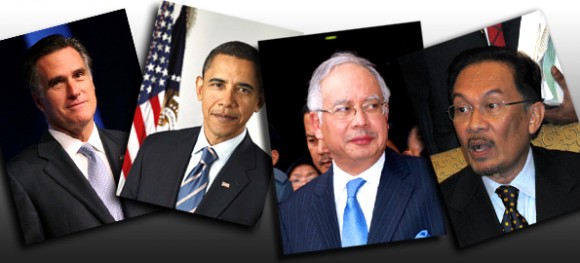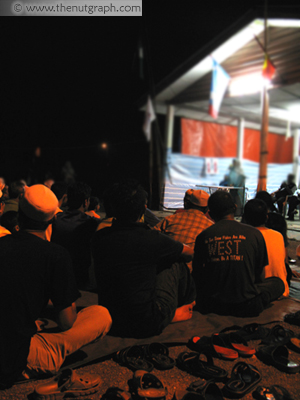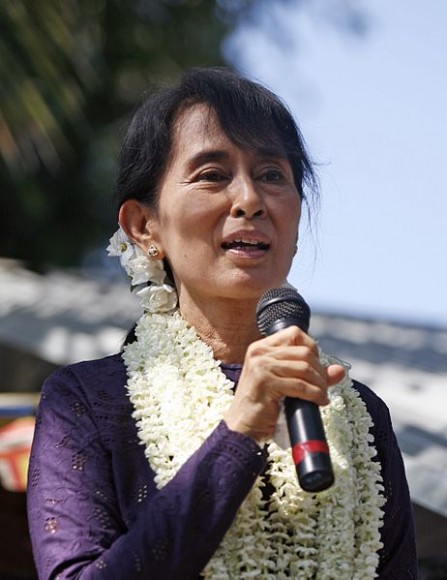“A LOT of people pick who to vote for the way they pick which sports team to support.” So said an American friend in a recent conversation about the US presidential elections.
Voters across the US go to the polls on 6 Nov 2012 unless Hurricane Sandy has delayed the holding of the elections. Malaysian voters will do the same within the next six months. In both countries, many would consider elections the hallmark of democracy. And most would say that democracy is a good thing – certainly Datuk Seri Najib Razak, Datuk Seri Anwar Ibrahim, Barack Obama and Mitt Romney do.
But underneath the team colours and the performance, the cheering and the competition, what are elections good for? And how can they be better?

Rule of the people
At its broadest, democracy is the rule of the people – the involvement of all in decision-making.
American theologian Reinhold Niebuhr notes that democracy is the only political system that is consistent in its pessimism about human nature. While other forms of government invest disproportionate trust in either the state or the ruler, democracy spreads the blame equitably.
But Niebuhr was no cynic. He wrote: “Man’s capacity for justice makes democracy possible; but man’s inclination to injustice makes democracy necessary.”
This balance of realism and idealism comes into play in democratic elections. Today’s nation states are too big and too complex for all citizens to participate in all policy decisions. So elections offer an efficient way of delegating that participation to chosen representatives.
But casting a ballot is not just a practical act. It is also an optimistic one: your unspoilt vote expresses the hope that the results of the elections will reflect your personal opinions – at least to some degree.
Choice and political campaigns
In Malaysia’s first-past-the-post system, voters pick candidates and the parties they represent. Our choices are based both on policy platforms and on personalities: if you can’t trust a candidate or party to stick to their stated goals throughout the four or five years in between elections, then your vote loses some of its meaning.

Enter electoral campaigns. These are meant to give voters the time and information to make up their minds, to discover and discuss the relative merits of different candidates and parties. Which are closer to your values? Which are more likely to be responsive to your evolving needs? Which have better track records? Which propose clearer plans?
These evaluations aren’t easy. Hence the calls for a longer campaign period, from Bersih 2.0 and others.
But it’s important that we don’t get fixated on longer campaign periods as an indicator of democratic health. In the US, presidential campaigns begin almost two years before an election – nearly half of a president’s term in office. Such extended campaigns can overwhelm policy discussion with fanfare, leaving voters saturated and sceptical.
At the third presidential debate on 22 Oct, Obama began his closing statement with: “You’ve now heard three debates, months of campaigning, and way too many TV commercials. And now you’ve got a choice.” His quip drew laughter but it also rang true. As of 26 Oct, his campaign had spent US$457 million on advertising alone. By the time the presidential and congressional polls close, analysts estimate that the elections would have cost nearly US$6 billion.
Two-party systems?
Inflated electoral campaigns are one instance of counterproductive investments masquerading as democratic advancement. Closer to home, we have the recent flurry of attention to two-party systems – why they matter, whether we have one, who they’re good for.
It seems that the two-party system has become a rallying symbol against the single-coalition dominance that Malaysians have faced since independence. But rejecting a single-party system isn’t the same thing as promoting a two-party system. In political science, the concept of a two-party system is associated with particular voting mechanisms and academic methodologies, not with democratic consolidation per se.
Besides, a two-party system isn’t equivalent to a strong democracy. For example, while the legislatures in Malaysia and the US are chosen through majoritarian elections that often produce two-party competition, legislatures in many other democracies are elected through proportional representation. Proportional representation, which is supported by Parti Rakyat Malaysia, is likely to yield numerous smaller parties rather than two large catch-all parties. And this would make the political and economic landscape more diverse and inclusive than just having two parties or coalitions.

Trade-offs abound. For example, I like the direct relationship between individual voters and representatives under our current majoritarian first-past-the-post system. But I dislike that established majoritarian systems can have large parties that are simultaneously wishy-washy and polarised, as in the US and England.
Structures and agency
In addition to thinking critically about the political processes we support, it’s important to note that democratic structures and symbols are no guarantee of democratic outcomes.
Historically, elections have coexisted with inequality – whether in ancient Athens, which generously empowered male citizens but sidelined women, slaves, and foreigners; or in 20th-century Switzerland, which was celebrated for its referenda long before it gave women the vote in 1971.
Regulating electoral campaigns doesn’t necessarily level the electoral playing field, either. Singapore, for one, officially limits electoral expenses and standardises party broadcasts, but this hasn’t diminished the PAP’s hegemony. Equality laws don’t eliminate prejudices, as is evident in the persistent racism within the US. And democratic structures may not ensure democratic vitality: a recent study of UK politics found worrying declines in party membership and mass participation, and a worrying growth in business influence.
On the other hand, defective institutions don’t necessarily constrain democratic activism. Our electoral system is highly flawed, but the Election Commission (EC) is now responding at least superficially to demands for accountability: anyone who visits the EC website first sees a pop-up window listing rebuttals to various articles from opposition-linked publications. Social mobilisation is changing the terms of the game.
We have far to go, but we can get there. And we will get there faster if we rigorously discuss a broad spectrum of possibilities for our shared future.

What Aung San Suu Kyi wrote in her 1991 essay “Freedom from fear” applies to us today: “A revolution which aims merely at changing official policies and institutions with a view to an improvement in material conditions has little chance of genuine success. … [And] it is not enough merely to call for freedom, democracy and human rights … A people who would build a nation in which strong, democratic institutions are firmly established as a guarantee against state-induced power must first learn to liberate their own minds from apathy and fear.”
As we look towards a more democratic Malaysia, we need to think carefully about the principles and processes that are best for our country. It isn’t worth fighting for structures that fall under the banner of democracy but fail to serve Malaysians. ![]()
Hwa Yue-Yi hopes that she will get to vote in the next general election, now that her absent voter application has been approved.


burrito harian says
I’m leaning towards the idea of multiple parties, however this must be built on grounds of tolerance and understanding. It doesn’t take a stretch of imagination to see how this can quickly descend into name-calling and partisan faction fights.
Handsome Iqbal says
Parties [formed] on racial lines must be banned. But that will take political will that is non-existent in Malaysia. Groups have taken over Malaysian democracy, and place segregation as the No. 1 policy. It will take a united opposition to be formed and the rewriting of the constitution. Malaysia is not ripe for that now, sadly.